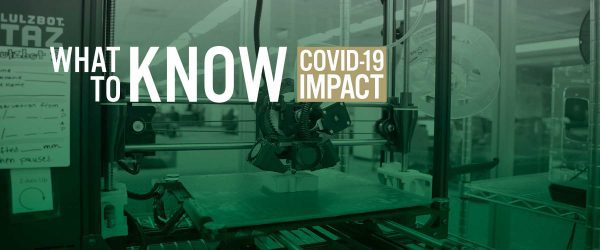Pitching in for protection: 3-D printing addresses health care challenge

Faculty members from three UNC Charlotte colleges are teaming up to use 3-D printers to produce protective shields designed to extend the life of the disposable face masks used by health care workers combating the COVID-19 pandemic.
So far, they’ve produced 250 shields for local frontline health care professionals and are sharing what they’ve learned with researchers across the country as they prepare for patient numbers in their states to climb.
Unable to work in the University’s state-of-the-art Makerspace labs due to the University’s shift to teleworking, faculty members from the Lee College of Engineering, the College of Arts + Architecture (CoA+A) and the College of Computing and Informatics (CCI) decided it was time to put their 3-D printers and talents to good use by taking them home.
The quickly assembled project illustrates the University’s capacity to deploy its academic energy from across the curriculum to tackle enormous and complex problems in the region and even across the country and the globe.
As the University transitioned to online instruction and telecommuting, Terence Fagan, associate teaching professor, Mechanical Engineering; Alex Cabral, director of Fabrication Labs for the School of Architecture, (CoA+A); and David Wilson, professor of Software & Information Systems (CCI) were happy to work from home rather than on campus to produce the devices in a way that allowed them to follow social distancing guidelines.
Among others, they were joined by art professors Heather Freeman and Tom Schmidt (CoA+A) along with Robby Sachs (CoA+A) and Johanna Okerlund (CCI).
“Several printers have been moved from Storrs into my apartment,” said Cabral.
A decision was made to produce the face shields because they can be worn in front of an original, industry-tested N95 mask. This shield effectively extends the life cycle of a mask that otherwise is a one-time-use item.
While most of their work is still ahead, progress is being made.
“Our group delivered 180 face shields to local health care professionals after two days of production,” Cabral said on Tuesday. “We are averaging about 100 per day, with a goal to mass manufacture and increase quantities tenfold.”
The project had its start when Fagan learned about a local grassroots fundraising campaign to manufacture the protective shields. The #MillionMaskChallenge was spearheaded by Tom Dubick, an engineering teacher at Charlotte Latin School. He and Fagan have worked together for more than a decade on various engineering projects in the Charlotte Latin Fablab, part of a global Fablab network that Dubick directs. To date, the campaign has raised more than $66,000 to cover the cost of materials.
“It was almost a serendipitous thing,” said Fagan. “Looking to the future, this is the perfect storm of what we need to do to break down barriers in the academic world and help bring manufacturing back to the United States.”
Wilson, who leads CCI’s Makerspace lab, said UNC Charlotte currently has an embedded group of faculty members from different disciplines working together on research projects with 3-D printers.
“When this issue of shortages in health care protection equipment came to light, it really took root and production ramped up over the weekend,” Wilson said from his home, where he uses a small 3-D printer for his research. “People are doing as much as they can to help out.”
Soon, UNC Charlotte students may have the opportunity to work directly on the fabrication project.
“It is my hope that we can create clear instructions on the printing process and begin sending out ‘packages’ of 3-D print files for our students to complete on their home machines,” said Cabral. “In the coming days, we should have more volunteer opportunities in design, production and delivery so we will be needing help.”
Cabral wants his students to understand they are working on concepts that exist in the physical world.
“This is an opportunity to live by those teachings while making a difference for thousands of people risking infection to help those most in need,” he said. “It’s been humbling to see everyone come together and bring so much experience, whether as fabricators, designers, engineers, medical professionals or industry experts and business owners.”
As UNC Charlotte faculty members explore technology options to accelerate production, they have been contacted by academic communities in states as far away as Virginia, Iowa, Colorado and California.
“We’ve begun sharing our work to get their labs running and hopefully helping with the impending national shortage of supplies,” Cabral said.
He added, “This effort shows how much our faculty, staff and students care about this community. We are neighbors, friends, husbands, wives, fathers, mothers, sons and daughters of people working to keep us safe in hospitals and clinics around the globe. Clearly, UNC Charlotte is integral to the identity of our city.”